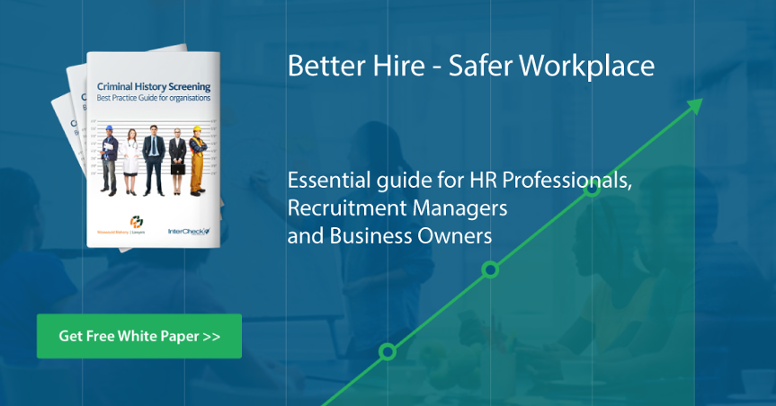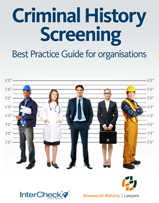
As a business owner or hiring manager, it is prudent to conduct Criminal History Checks on existing employees or new recruits, to ensure your business is safe from potential risks. By hiring any individual with a criminal history that undermines their credibility to perform their role, you could be jeopardising the safety of your workplace, clients, and business reputation. However, it is crucial to make sure that job applications from people with criminal records are handled in a fair, mature, and unprejudiced manner, so as to avoid any future lawsuits or investigations from government agencies. In this article, we have provided you with a list of best-practice procedures to consider when processing such applications so your company can protect itself without being perceived as discriminatory.
Advertise the requirement for a police check before accepting applications
If you want candidates to undergo police checks prior to getting hired, you should inform them about this requirement even before they submit their applications. By stating it on job advertisements, application forms, and during the interview, you can make sure that candidates are aware of how an assessment of their criminal record could affect the success of their application. This way, you can manage expectations of hopeful candidates and also prepare those with criminal records for the additional scrutiny that will be applied to their applications.
Build a hiring matrix
Many hirers build what is called a “hiring matrix” to help cope with applications from people with criminal records. These matrixes are part of the screening process and define – ahead of the application being received – the types of Criminal records that would disqualify a candidate from a specific position. It is also worthy to consider the types of criminal records your business would be willing to accept on a person’s record.
While assessing an individual’s criminal history, use the matrix as a resource and guideline; this will not only make the screening process expedient for you, but it will also make your decision appear more considered, objective and professional. If the offence that the individual committed is not listed on your list of unacceptable court outcomes, then you can now more rapidly and decisively begin considering other merits of the application. Yet, it is still highly advisable to apply a nuanced case-by-case assessment of a candidate’s criminal record, and to give the person a chance to address their criminal history – even if their offences are listed on your matrix. In essence, allow the hiring matrix to guide you through the screening process but try not to apply it blindly and indiscriminately.
Consider the nature of the role against the candidate’s criminal record
To make sure that your business is not guilty of workplace discrimination based on people’s criminal records, you should consider carefully whether the candidate’s criminal record is relevant to the core functions of the role they are applying for. For instance, if you hire a convicted sex offender for a role that involves working with children or working with vulnerable people, you could be jeopardising your clients’ trust in your organisation’s safety standards. In that case, it would be justified to prevent that candidate from taking on the role, even if they are qualified otherwise. However, if you reject a qualified candidate’s application to work as a baker, for example, because of them receiving a conviction for driving under the influence from six years ago, then that decision may be perceived as unfair and discriminatory.
Consider how old the offence is
When a candidate reveals their criminal record to you at the recruitment stage, it is important to consider their record in a nuanced manner. If their conviction was incurred a long time ago, ask yourself whether it is possible that they could have rehabilitated and reformed themselves in the time that has lapsed. If they have not committed any offences since their last charge a while back, it is perhaps reasonable to assume that they learnt from their mistake, and deserve an opportunity to prove themselves. This factor, however, should be considered cumulatively with the seriousness of the record and its relevance to the specific role. If a person who has a history of embezzlement, albeit a long time ago, is hired to work with accounts, that could lead to future difficulties with trust, safety, and credibility. Yet, if someone was convicted for a small offence nine years ago, and have been clean and responsible since then, it might be worth giving the applicant a chance to move past the limitations of their criminal background.
Consider their employment history
Even if a candidate has a criminal record, their employment history, both before and after the conviction, could tell you a lot about their suitability for the role – as it shows how reliable and trustworthy they are as employees. If a person had been employed with a reputable organisation for a long time and are positively recommended by their supervisor, it would be reasonable to assume that they have a strong work ethic, despite their criminal record. More importantly, if the person has been employed since their conviction, and established themselves as a productive member of that organisation, then it is perhaps safe to assume that they have been rehabilitated, and would not be a significant threat or risk to your workplace.
Have an honest conversation
It is best practice to allow the candidate to explain the individual circumstances of their case once you discover that they have a criminal record. Whether the candidate revealed the information themselves, or it appeared on their police check certificate, having an honest conversation will help you understand the candidate’s character and motivations better. You will be able to make a more clear assessment of how the individual’s criminal history relates to their personality and behaviour now. Most importantly, it will help you explain to them that you will not be automatically dismissing their application based on their record, but will be assessing it carefully and sensitively. This way, even if the candidate is not successful, they will not feel unfairly treated in the recruitment process.
Look for the positives
You should do a thorough background check on an individual before hiring them, but in doing so, don’t actively look for reasons to knock the applicant down. Look for the positives too. If the individual is highly qualified and a high achiever in their field, that should still be an important factor in your decision to hire them, as it would with any candidate without a criminal record.









